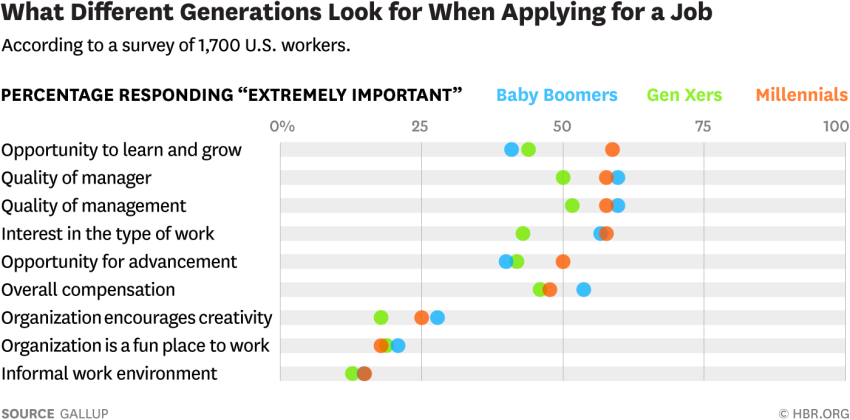Employee Leadership Training: The Key to Employee Retention

One of the disruptive trends in talent development is that the labor market is becoming more challenging.
Why is that? One word: Millennials.
Millennials have gained a reputation as restless employees, inclined to leave for new companies when they don’t get what they want out of their current employer. In order to improve employee retention, businesses need to spend more time connecting with their Millennials (and all employees), and delivering what employees want in an effective way. One thing that most workers desire is an opportunity to advance in their career, thus leadership training programs should be an important component of every modern company’s employee retention strategy.
In a Harvard Business Review article, Gallup asked workers from different generations what they found extremely important about a new job:

In a survey recently discussed by Eric Spicer of Arizona State University, employees said that leadership development opportunities can keep them more engaged and motivated. Spicer also discussed that high turnover can significantly reduce profits and threaten an organization’s sustainability. By implementing leadership training programs, companies can improve employee morale and loyalty, thus enjoying a competitive advantage in the marketplace due to lower turnover and better management.
According to McKinsey, most CEOs rate leadership development as a priority yet at the same time, very few CEOs are currently satisfied with their own company’s efforts. McKinsey offers the following tips to develop effective leaders:
Although employees desire career trajectory and leadership development, companies need to recognize that not every employee will make a great manager. According to Gallup research, companies aren’t always very good about selecting people to groom for management. Only about 10 percent of employees have the characteristics to become great managers, and perhaps another 10 percent could become decent managers with proper training.
Most companies do employ the next generation of great managers, but they probably only have a few. In addition, businesses have to understand that the most productive employee won’t always be the best candidate to manage other employees. Current managers need to recognize the characteristics of good managers and groom them appropriately.
Harvard Business Review found that only about one-third of workers actually hope to get promoted to management, and far less have the ambition to occupy an executive suite. While most employees want a chance to progress in their careers and perhaps, become better leaders, they don’t all want management to be the main focus of their job description.
Companies also need to retain key employees who will follow technical, training, or other tracks in their careers. To improve employee retention and morale, it’s best to focus on identifying potential managers and other key employees. Then businesses might prosper if they develop leadership training programs with different goals for different sets of employees.
Today’s workers are tomorrow’s leaders. Your retention training program should reflect the needs of your audience to keep them invested in your organization. Effective retention training reduces hiring costs and increases innovation. Use these leadership programs for employees to unlock your team’s full potential.
Most companies will benefit by figuring out what their employees want from their careers and then placing them in positions where they have a chance to achieve these goals. When people see that their companies are actively investing in their own development, the result will likely be higher employee engagement and better performance. And it will start to feed a positive cycle that can bring your organization to new heights.
Blog
In a Harvard Business School case study titled Creating a virtual internship at Goldman Sachs, the authors describe how The Goldman Sachs Group successfully transitioned a program serving thousands of interns into one that became entirely virtual.
Blog
Craig Weiss of The Craig Weiss Group, renowned for his expertise in learning technology, e-learning and AI in the workplace, spoke about AI In L&D: Roles, Risks, and Opportunities.
Blog
For Marriott, emerging from the pandemic presented a key opportunity to take stock and strategize how to improve worker retention and customer service — and the hospitality chain recognized that cultivating the best possible leaders was essential for navigating the changing landscape.
Blog
Learning management is a perennial challenge for L&D teams. Despite the emergence of more sophisticated learning and business analytics techniques, struggles with learning measurement persist at frustrating levels. Closing the gap between the boardroom and L&D around actual business or organizational impact is a required skill for learning leaders to master.
Blog
A social learning platform activates the deep and continual skill development needed for enduring behavior change in the context of modern business.
Blog
NovoEd enables executive education providers to build online learning experiences for custom executive education programs, open enrollment courses, and more.